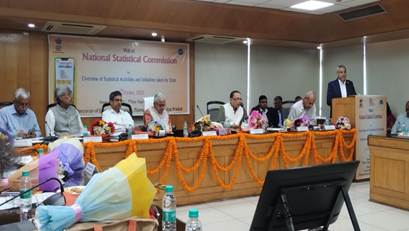Interaction between National Statistical Commission and Government of Uttar Pradesh on Strengthening the State Statistical System
Interaction between National Statistical Commission and Government of Uttar Pradesh on Strengthening the State Statistical System
The National Statistical Commission (NSC) held an interactive session with the Government of Uttar Pradesh on 14 October 2025 at Yojna Bhawan, Lucknow, to have an overview of the State’s statistical system. The interaction focused on improving the quality, timeliness and methodological consistency of official statistics and ensuring a transparent and robust estimation process for the State’s Gross Domestic Product (GSDP).
The interaction was attended by Prof. Rajeeva Laxman Karandikar, Chairman, NSC, Prof. A. Ganesh Kumar, Prof. Debasis Kundu, and Shri Asit Kumar Sadhu, Members of the Commission, along with Dr. Saurabh Garg, Secretary, Ministry of Statistics and Programme Implementation (MoSPI) and Member Secretary, NSC. Senior officials from MoSPI and key officers from the Government of Uttar Pradesh also participated. The Commission underscored the importance of methodological development and capacity-building to enhance the credibility and reliability of statistics.
The meeting began with a welcome address by Mrs. Alka Bahuguna Dhoundiyal, Director, Directorate of Economics and Statistics (DES), who highlighted the growing importance of accurate, granular and timely data in achieving the vision of Viksit Uttar Pradesh and Bharat @2047. She noted that reliable statistics are essential for planning, monitoring, and achieving the developmental goals of the State.
Shri Alok Kumar, Principal Secretary (Planning), Government of Uttar Pradesh, presented the framework of the State’s One Trillion Dollar Economy (OTD) Mission. He shared the Chief Minister’s vision of positioning Uttar Pradesh as a leading contributor to the national economy and highlighted several ongoing initiatives, including the Samarth UP portal, Family ID database and the Women Economic Empowerment (WEE) Index. These measures, he explained, aim to promote data-driven decision-making and balanced regional development.
Presentations by the DES team outlined the State’s progress in strengthening its statistical infrastructure. Technical sessions covered improvements in GSDP estimation, preparation of District Domestic Product (DDP) and use of administrative and survey data for a bottom-up approach. Presentations were made on the methodology for assessing economic activity from large-scale events such as the Mahakumbh and on pilot surveys for the Periodic Labour Force Survey (PLFS) and All-India Survey on Unincorporated Sector Enterprises (ASUSE).
Dr. Saurabh Garg, Secretary, MoSPI, emphasized the importance of integrating administrative data, adopting digital platforms and improving methodological transparency in the statistical process to bring our granular, high frequency, reliable and timely data. He underlined that harmonization of data sources, use of modern tools such as GIS and dashboards and accessibility of data to users are crucial for effective governance and evidence-based policymaking.
The NSC members appreciated the Uttar Pradesh Government’s initiatives to modernize its statistical system and integrate data systems across departments. They encouraged the State to continue refining estimation methods, strengthen sampling designs and adopt uniform standards in collaboration with MoSPI. The Commission assured the State of continued technical guidance and support in enhancing methodological rigor and ensuring greater transparency in statistical compilation.

Senior officials from MoSPI and the State Planning Department exchanged views on key statistical domains, including the Gross State Domestic Product, Annual Survey of Industries (ASI), Index of Industrial Production (IIP), National Sample Surveys (NSS), and Price Statistics. Both sides emphasized the importance of improving the granularity of data at the district level and expanding the use of technology to enable real-time monitoring and dissemination.
The interaction also featured discussions on best practices and innovations such as the WEE Index, Family ID initiative and grievance redressal and programme monitoring dashboards. These initiatives were recognized as significant steps toward integrated data management and better service delivery. The NSC members lauded these efforts as examples of how data can be effectively used to promote inclusivity and accountability.
In the concluding session,Dr. K. V. Raju, Economic Advisor to the Hon’ble Chief Minister and Shri Awanish Kumar Awasthi, Advisor to the Hon’ble Chief Minister reiterated the State’s commitment to evidence-based planning and data-driven governance and expressed appreciation for the valuable guidance and technical support extended by the National Statistical Commission and the Ministry of Statistics and Programme Implementation.
The meeting concluded with observations from the Chairman, NSC, Prof. Rajeeva Laxman Karandikar, who commended the State’s commitment to building a strong and transparent statistical system. He noted that Uttar Pradesh has made visible progress in institutional capacity-building and emphasized the importance of continuing methodological improvements in GSDP estimation to reflect realistic and evidence-based trends.